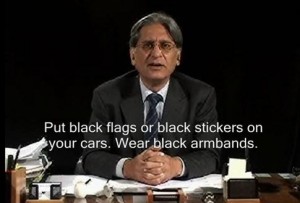Carlotta Gall: ISI Sheltered Bin Laden in Pakistan
The New York Times has just released an excerpt from Carlotta Gall’s upcoming book “The Wrong Enemy: America in Afghanistan, 2001-2014″. Recall that Gall lived in Afghanistan and covered Afghanistan and Pakistan for the Times from 2001-2013 (Declan Walsh also covered Pakistan from inside Pakistan until he was expelled just before the election in 2013). The biggest revelation in the excerpt is that Pakistan knew about, and Pakistan’s intelligence agency, the ISI, actively sheltered, Osama bin Laden when he was in hiding in Pakistan.
Gall claims that then-ISI head Ahmed Shuja Pasha had direct knowledge of bin Laden’s presence:
Soon after the Navy SEAL raid on Bin Laden’s house, a Pakistani official told me that the United States had direct evidence that the ISI chief, Lt. Gen. Ahmed Shuja Pasha, knew of Bin Laden’s presence in Abbottabad. The information came from a senior United States official, and I guessed that the Americans had intercepted a phone call of Pasha’s or one about him in the days after the raid. “He knew of Osama’s whereabouts, yes,” the Pakistani official told me. The official was surprised to learn this and said the Americans were even more so. Pasha had been an energetic opponent of the Taliban and an open and cooperative counterpart for the Americans at the ISI. “Pasha was always their blue-eyed boy,” the official said. But in the weeks and months after the raid, Pasha and the ISI press office strenuously denied that they had any knowledge of Bin Laden’s presence in Abbottabad.
Although Pasha knew, it appears that ISI compartmented the knowledge very carefully:
In trying to prove that the ISI knew of Bin Laden’s whereabouts and protected him, I struggled for more than two years to piece together something other than circumstantial evidence and suppositions from sources with no direct knowledge. Only one man, a former ISI chief and retired general, Ziauddin Butt, told me that he thought Musharraf had arranged to hide Bin Laden in Abbottabad. But he had no proof and, under pressure, claimed in the Pakistani press that he’d been misunderstood. Finally, on a winter evening in 2012, I got the confirmation I was looking for. According to one inside source, the ISI actually ran a special desk assigned to handle Bin Laden. It was operated independently, led by an officer who made his own decisions and did not report to a superior. He handled only one person: Bin Laden. I was sitting at an outdoor cafe when I learned this, and I remember gasping, though quietly so as not to draw attention. (Two former senior American officials later told me that the information was consistent with their own conclusions.) This was what Afghans knew, and Taliban fighters had told me, but finally someone on the inside was admitting it. The desk was wholly deniable by virtually everyone at the ISI — such is how supersecret intelligence units operate — but the top military bosses knew about it, I was told.
Gall’s reporting on Taliban factions and their madrassas came at great personal risk. This story picks up at a point where her Pakistani colleagues have been picked up by the ISI at the hotel where they were staying and she had been summoned to meet the ISI agents outside: Read more →

